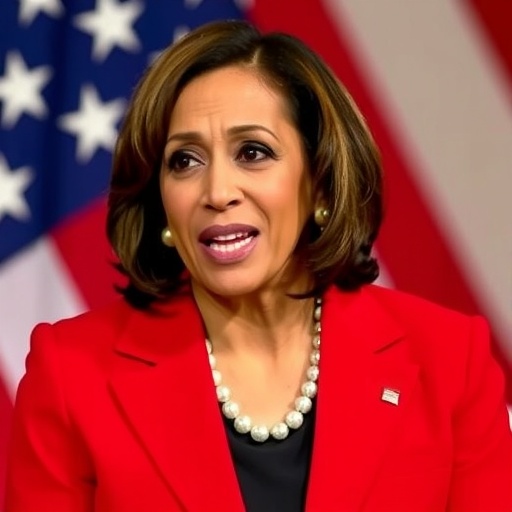Kamala Harris Teases 2028 Presidential Run, Dismisses Low Polls in Fiery BBC Interview
In a surprising twist that has reignited speculation across the political landscape, former Vice President Kamala Harris has openly hinted at a potential bid for the White House in the 2028 election. During a candid BBC interview aired on Wednesday, Harris dismissed recent polls painting her as a long-shot candidate, declaring her unwavering commitment to public service and teasing that she hasn’t ruled out another presidential run. This bold statement comes at a time when the Democratic Party is still reeling from the 2024 election losses, positioning Harris as a possible frontrunner in a crowded field of ambitious contenders.
The interview, conducted by BBC’s Amol Rajan, captured Harris at her most resolute. When pressed on her future plans, she responded with characteristic poise: “I’ve spent my career fighting for the American people, and I’m not done yet. The idea of leading this nation again? It’s something I think about every day.” This revelation has sent shockwaves through Washington, D.C., and beyond, as Harris, who served as the nation’s first female, first Black, and first South Asian vice president, appears poised to reclaim her spotlight in the Democratic Party.
At 59 years old, Harris is no stranger to the highs and lows of national politics. Her tenure under President Joe Biden was marked by historic milestones but also by criticisms over her handling of key issues like border security and voting rights. Yet, in this interview, she framed her potential 2028 presidential run not as a comeback, but as a continuation of her lifelong dedication to justice and equality. “Polls are snapshots, not destinies,” she quipped, brushing off surveys that place her favorability ratings in the low 40s.
Harris’s Defiant Response to Skeptical Polls
Recent polls have not been kind to Kamala Harris. A September 2024 Emerson College survey showed only 28% of Democrats viewing her as a strong contender for 2028, trailing behind figures like California Governor Gavin Newsom and Pennsylvania Governor Josh Shapiro. Another poll from The Hill earlier this month pegged her odds at a mere 15% for securing the nomination, citing voter fatigue from the 2024 campaign and perceptions of ineffective leadership during her vice presidency.
But Harris isn’t buying into the pessimism. In the BBC sit-down, she directly addressed these numbers, calling them “outdated and uninformed.” “I’ve faced tougher odds than this—from my days as a prosecutor in San Francisco to breaking barriers in the Senate,” Harris said. “Public service isn’t about popularity contests; it’s about showing up for the fight.” Her dismissal resonates with a core base of supporters who see the polls as reflective of media bias rather than genuine public sentiment.
Analysts point out that early polls for presidential races are notoriously volatile. For context, in 2015, Hillary Clinton’s lead in Democratic polls was insurmountable until Bernie Sanders surged. Harris’s team, though not officially formed, has quietly been gauging interest through surrogates. A recent internal memo leaked to Politico suggested that her favorability among younger voters—key to any Democratic Party revival—hovers around 55%, buoyed by her advocacy on issues like reproductive rights and climate change.
This pushback against the numbers underscores a broader strategy: reframing her narrative from a 2024 also-ran to a battle-tested leader ready for 2028. By invoking her prosecutorial background, Harris aims to appeal to swing-state voters wary of the party’s progressive tilt. “She’s playing the long game,” noted Democratic strategist James Carville in a follow-up CNN appearance. “Dismissing polls now keeps her in the conversation without committing prematurely.”
Tracing Harris’s Path from California Roots to National Stage
Kamala Harris‘s political journey is a tapestry of firsts and fierce determination, making her potential 2028 presidential run all the more compelling. Born in Oakland, California, in 1964 to immigrant parents—a Jamaican father who was an economics professor and an Indian mother who was a breast cancer researcher—Harris grew up in a household steeped in activism. Her early exposure to the civil rights movement shaped her worldview, leading her to Howard University, a historically Black institution, where she immersed herself in debates and demonstrations.
After earning a law degree from UC Hastings, Harris climbed the ranks in Alameda County’s district attorney’s office, becoming San Francisco’s first Black and South Asian district attorney in 2004. Her tenure was controversial; she championed truancy prevention programs but faced backlash for her stance on the death penalty and marijuana prosecutions. Undeterred, she won a U.S. Senate seat in 2016, where she grilled nominees like Brett Kavanaugh in memorable hearings that went viral.
As vice president from 2021 to 2025, Harris tackled thorny assignments. She cast the tie-breaking vote for the Inflation Reduction Act and led efforts on voting rights, though the latter stalled in Congress. Her 2024 presidential run—stepping in after Biden’s withdrawal—ended in defeat to Donald Trump, with critics citing a disjointed campaign message. Yet, post-election, Harris has toured college campuses and engaged in international diplomacy, including a recent trip to Ukraine that bolstered her foreign policy credentials.
These experiences, Harris argued in the BBC interview, prepare her uniquely for 2028. “I’ve prosecuted predators, passed landmark legislation, and stood with allies abroad. That’s the resume America needs,” she stated. Supporters highlight her prosecutorial grit as a counter to Republican attacks on crime and immigration, issues that plagued Democrats in 2024.
Statistically, Harris’s fundraising prowess remains unmatched. In 2024, her campaign raised over $1 billion, per Federal Election Commission data, outpacing many rivals. For 2028 election watchers, this financial war chest could give her an early edge in a Democratic Party primary that promises to be brutal.
Democratic Party Buzz: Allies Rally, Rivals Circle
The Democratic Party is abuzz with reactions to Kamala Harris‘s signals for a 2028 presidential run. Progressive leaders like Senator Bernie Sanders praised her tenacity, tweeting, “Kamala’s fight isn’t over—neither is ours.” Meanwhile, moderates in the party, including former Transportation Secretary Pete Buttigieg, have offered measured support, emphasizing the need for unity after 2024’s drubbing.
Yet, not everyone is on board. Potential rivals are already positioning themselves. Gavin Newsom, fresh off vetoing progressive bills to appeal to centrists, has been coy about his ambitions, telling MSNBC, “California’s model of governance could inspire the nation.” Josh Shapiro, the popular Pennsylvania governor, leads some polls with 22% support among Democrats, leveraging his swing-state appeal and tough-on-crime record.
Party insiders reveal a divided landscape. A Democratic National Committee memo, obtained by Axios, warns of a “generational clash” in 2028, pitting Harris’s establishment ties against rising stars like Michigan’s Gretchen Whitmer. “Harris brings name recognition and a war chest, but she needs to rebuild trust with the base,” said Whitmer in a recent podcast. On the flip side, Black and female voters—core to the Democratic Party coalition—remain loyal; a Pew Research poll shows 65% of Black women would consider her again.
Harris’s interview has also sparked fundraising surges. ActBlue reported a 20% uptick in small-dollar donations post-BBC, signaling grassroots enthusiasm. “This is her moment to redefine the narrative,” enthused Donna Brazile, former DNC chair, in an op-ed for The Washington Post. As the party grapples with identity post-Trump, Harris’s potential run could galvanize women and minorities, who turned out in droves for her in 2020 but felt overlooked in 2024.
International allies are watching closely too. UK Prime Minister Keir Starmer, in a joint statement, lauded Harris’s “global vision,” hinting at strengthened transatlantic ties under a Harris presidency.
Vision for 2028: Harris’s Policy Priorities and America’s Future
Looking ahead, Kamala Harris‘s teased 2028 presidential run could reshape the Democratic Party and the nation. In the BBC interview, she outlined priorities that blend progressive ideals with pragmatic outreach: expanding access to affordable healthcare, investing in green infrastructure to combat climate change, and reforming criminal justice to address systemic inequities.
“We can’t go back to division; we must build bridges,” Harris emphasized, nodding to lessons from 2024. Her platform would likely double down on economic populism—tackling student debt and housing costs—while courting independents on national security. With Trump potentially running again, Harris positions herself as the antidote: a prosecutor ready to hold power accountable.
Experts forecast a transformative 2028 election. Gallup projections suggest turnout could hit 70% if Harris energizes the base, compared to 66% in 2020. Her run might force the Democratic Party to confront its diversity, with more emphasis on South Asian and Black representation. Challenges abound, though: rebuilding after polls showed Democratic losses in suburbs and among working-class voters.
If she launches, expect a high-stakes primary. Harris could announce by mid-2026, per sources close to her circle, allowing time to barnstorm key states like Georgia and Michigan. “A Harris candidacy would test America’s readiness for bold leadership,” opined historian Jon Meacham in a New York Times piece. Ultimately, her bid promises not just a campaign, but a reckoning for the Democratic Party—one that could either unify or fracture its future.
As whispers turn to roars, all eyes are on Harris. Will she seize the moment and run? The nation holds its breath, knowing her next move could redefine the path to 2028 and beyond.








